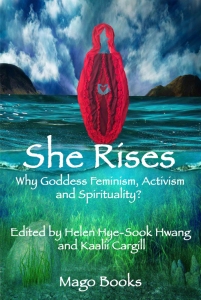I’ve seriously explored my spirituality for nearly 40 years, since i began college. Raised catholic, i immersed myself in that religion and its mystical tradition. and for a long time it served me well.
but over time, as i matured in all areas of my life, i saw the effects of patriarchy on society and in my religion. language was and is the most obvious sign of patriarchy. what is wrong with saying “all people” instead of “all men”? i’ve asked over and over? and most people do not care enough to change even in this small way.
the effects of patriarchy in our world, in our history, are devastating. History has almost entirely obliterated Her-story. This book, a collection of essays by many women who are speaking loudly against patriarchy and loudly for the Divine Feminine, referred as Mago. the editor of this book, Helen Hye-Sook Hwang, describes the Divine Feminine in her intro:
“S/HE as the Source of all beings precedes the ‘God’. …S/HE is the First Mother, the Great Goddess, from whom all beings on earth originate for existence. S/HE manifests in the form of Her female descendent, the Goddess. … The Great Goddess is called many names according to ancient peoples of the world. Mago is the one that I introduce.” (p. 3)
The essays in She Rises are extremely powerful. One which particularly resounds with me is “Why Women Need the Goddess” by Carol P. Christ. She says:
“Because religion has such a compelling hold on the deep psyches of so many people, feminists cannot afford to leave it in the hands of the fathers. Even people who no longer ‘believe in God’ or participate in the institutional structure of patriarchal religion still may not be free of the power of the symbolism of God the Father. A symbol’s effect does not depend on rational assent, for a symbol also functions on levels of the psyche other than the rational….The reason for the continuing effects of religious symbols is that the mind abhors a vacuum. Symbol systems cannot simply be rejected; they must be replaced. Where there is no replacement, the mind will revert to familiar structures at times of crisis, bafflement, or defeat.” (45)
“The simplest and most basic meaning of the symbol of Goddess is the acknowledgement of the legitimacy of female power as beneficent and independent power. ….[T]he divine principle, the saving and sustaining power, is in herself, that she will no longer look to men or male figures as saviors.” (49)
The Goddess/Mago is not about a literal female. It is about a deep understanding of the principles of the feminine. Life comes forth from women. This planet provides life, hence she is female. Our rape of land parallels the rape of women.
The Hebrew OT is filled with myths and events, and these myths often taken literally by certain groups within Judaism and Christianity (the Genesis story for example. These myths, these warring stories in the OT, tell of killing the myths of and people who believed in the Great Goddess/Mago. The Mago myths and lives were of peace and respect. The OT myths and people were of war, of a male God Destroyer.
This book will trigger thinking about patriarchy and its negative effects in this world. Wars in the Middle East target women. Politics in the US target women and children. People in Asian countries devalue girl-babies. These are the result of patriarchy.
Mago values life, the image of The Great Goddess. It doesn’t devalue the male. It is a way of life, of peace, of health.
I strongly recommend this book.

